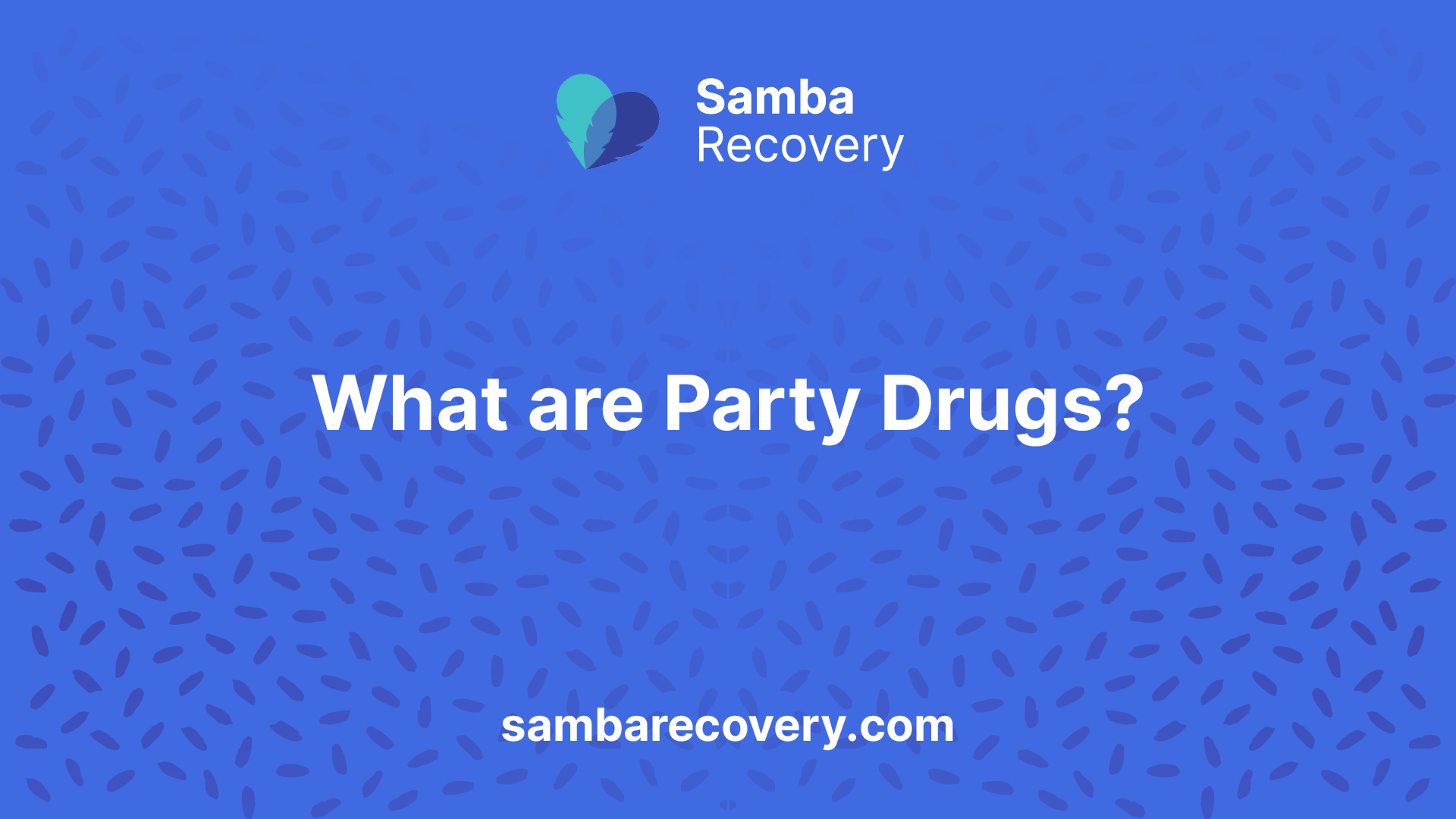Understanding Party Drugs
Party drugs, often used at social gatherings like festivals or concerts, are substances that can have various effects on the mind and body. The central question, “what are party drugs?”, is a necessary one to answer, considering the potential risks associated with their use.
Definition and Usage
Party drugs, also known as recreational or club drugs, are substances typically consumed in social settings to enhance experiences. They can alter perception, mood, and cognition, leading to a range of effects on the mind and body. Often, these drugs are used by young adults seeking to experience more intense emotions and sensations. However, the use of party drugs is generally illegal due to their potential for harm and the direct impact they have on the nervous system.

Types of Party Drugs
Party drugs can be categorized into three main groups based on their effects on the central nervous system:
- Depressant Drugs: These drugs slow down the central nervous system, resulting in relaxation, sedation, and reduced inhibitions. Examples include alcohol and benzodiazepines.
- Stimulant Drugs: These drugs speed up the central nervous system, leading to increased energy, alertness, and euphoria. Examples include cocaine and methamphetamine.
- Hallucinogen Drugs: These drugs alter an individual’s perception of reality, often resulting in hallucinations, sensory distortions, and intense spiritual experiences. Examples include LSD and psilocybin.
Each of these types of drugs carries its own risks and potential for damage or addiction, which is why their use is often illegal [1]. Understanding the different types of party drugs and their effects can help individuals make informed decisions about their health and well-being.
Risks and Dangers
While party drugs might seem appealing in a festive setting, they carry a lot of risks and potential dangers. It is important to understand the short-term effects, long-term impacts, and legal consequences associated with the use of these substances.
Short-term Effects
Party drugs like MDMA, also known as molly or ecstasy, are designed to amplify the sensation of the party experience. However, they can have serious short-term effects on the user’s health. For instance, ecstasy can cause blurred vision, distort perception, and give a false sense of confidence and energy, potentially leading to aggressive driving and an inability to make quick decisions. Moreover, individuals can become exhausted, dehydrated, sleepy, and less attentive after taking ecstasy, increasing the risk of accidents if they drive.
Furthermore, party drugs are frequently produced illicitly, leading to them being mixed or cut with other harmful substances. Substances such as methamphetamine, caffeine, ephedrine, cocaine, ketamine, heroin, phencyclidine (PCP), cathinones (bath salts), or dextromethorphan (DXM) could be found in MDMA tablets. This unpredictable composition makes it challenging to predict their effects accurately.
Long-term Impacts
In addition to the immediate effects, party drugs can have long-term impacts on users’ health. Repeated use can lead to physical, emotional, and behavioral health issues, potentially resulting in addiction. Although medical MDMA addiction is rare, compulsive use increases the risk of hospitalization and death. Awareness of one’s MDMA use and seeking help if compulsive usage is noticed is crucial.
An overdose can occur, especially when MDMA is combined with other drugs. Signs of an overdose include difficulty maintaining proper body temperature, which can lead to critical health issues like brain swelling and failure of the liver, kidneys, and cardiovascular system. If signs of an overdose are noticed, immediate medical attention is necessary.
Legal Consequences
The use and possession of party drugs are usually illegal. Violation of these laws can lead to significant legal consequences, including fines, probation, and even jail time. Additionally, the use of party drugs contributes to several leading causes of death among young people, as seen in Australia, where alcohol is the most used drug. It’s important to recognize the risks and dangers associated with the use of party drugs and make informed decisions about their use.
Effects on Health
Party drugs can have profound effects on the health of individuals who use them. These effects can be physical or mental, and in some cases, can lead to addiction.
Physical Effects
The physical effects of party drugs can be both short-term and long-term. Short-term effects can include an enhanced mood, impaired judgment, and distorted perception. While these effects might seem harmless or even desirable in a party setting, they can also lead to risky behavior, accidents, and health problems.
In the case of drugs like MDMA, long-term physical effects can be severe. Overdose can occur, particularly when combined with other substances, and can lead to difficulty maintaining proper body temperature, which can in turn cause critical health issues like brain swelling and failure of the liver, kidneys, and cardiovascular system.
Mental Effects
The mental effects of party drugs can also be severe and long-lasting. Long-term use can lead to addiction, which can have profound impacts on mental health. Additionally, the use of party drugs can worsen pre-existing mental illnesses, adding another layer of risk to their use.
Addiction and Treatment
Addiction is a significant risk associated with the use of party drugs. Compulsive use of drugs like MDMA can increase the risk of hospitalization and death. While addiction to MDMA is rare, it can occur, particularly in individuals who use the drug compulsively [3].
Treatment for addiction to party drugs often involves therapy. Medical professionals can connect individuals struggling with addiction to counselors or treatment facilities aimed at reducing drug use. Despite the challenges, there is hope for those struggling with compulsive party drug use [3].
Understanding the effects of party drugs on health is crucial to making informed decisions about their use. Party drugs can have serious consequences, and their use should not be taken lightly. Always seek professional advice if you or someone you know is struggling with drug use or addiction.
References
[1]: https://www.northstarbehavioralhealthmn.com/resources/what-are-party-drugs
[2]: https://www2.courtinfo.ca.gov/stopteendui/teens/resources/substances/ecstasy/short-and-long-term-effects.cfm
[3]: https://americanaddictioncenters.org/blog/party-drugs
[4]: https://www.betterhealth.vic.gov.au/health/healthyliving/partying-safely-tips-for-teenagers






